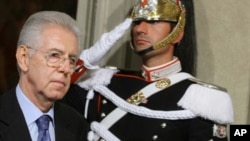Italian Prime Minister-designate Mario Monti, a former top EU commissioner, has been asked by the country's president to form a new government. The move comes a day after Prime Minister Silvio Berlusconi's resignation, following international financial concerns about the Italian economy.
After at least 17 meetings with senior politicians on Sunday, Italian President Giorgio Napolitano asked Mario Monti to form a new government.
The former EU commissioner said he would fight to grow the country's economy and rebuild pride in Italy. "I intend to fulfill this task with a great sense of responsibility and service toward our country,” he said. “In a moment of particular difficulty for Italy, in a turbulent situation for Europe and the world," he added, "the country needs to meet the challenge," he said.
Former coalition partners, the Northern League Party, have refused to back Mr. Monti as prime minister, instead calling for early elections. Analysts say it is a sign that prime minister-designate faces a tough challenge in implementing a major austerity package that was approved by parliament in the past week to reduce Italy's huge public debt.
The naming of Mario Monti as Italy's new prime minister came less than 24 hours after Silvio Berlusconi’s resignation, which was cheered on the streets of Rome.
Italy’s borrowing costs soared last week and investors made it clear they wanted Mr. Berlusconi out of office. He addressed the nation on television on Sunday. "Italy is among the founders of the European Union," he said. "We will be at Italy's service, as always. To those who celebrated, to salute what they call my exit from the scene, I want to say very clearly, I will redouble my efforts in parliament and institutions to renew Italy," he said.
The new cabinet is expected to be announced on Monday. And analysts say it faces a daunting challenge. Italy’s government debt is about 120 percent of the country's gross domestic product. And Italy's economic growth has been nearly stagnant for a decade and a half.
Political analyst Claudio Borghi says Italy’s problems are too great for the new government to solve by itself. “One should think, ‘Is it a problem of Italy or is it a problem of the architecture of the euro debt that has to be changed, deeply?’ Because Italy, of course, can need a lot of reforms. But it’s like if someone had a heart attack. So he has a heart attack and people start to complain that he’s fat, that he has to do a diet, that he has to go to the gym. It is true. We have to do a diet; we have to go to the gym. But at the moment, it is the heart attack that matters and we are not going to change it with reforms," he said.
Investors will be watching the financial markets this week for reaction to how Mr. Monti addresses Italy's economic situation.
Mario Monti to Lead Italy's New Government











